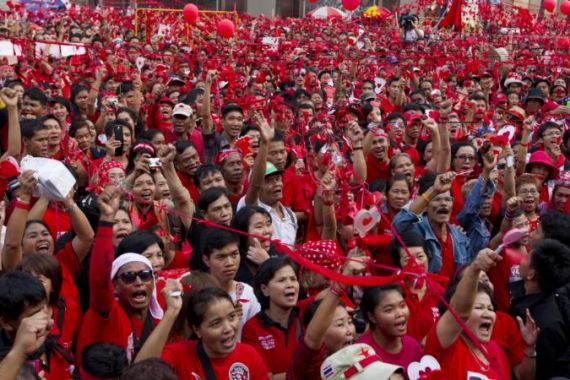Thai red shirts form alliance ahead of polls
Protest group endorses political party and returns to the streets, one year after a brutal crackdown saw dozens killed.

 |
| May 19 marked the first anniversary of a bloody showdown, when Thai troops moved in on the Ratchaprasong intersection in Bangkok, taken over by Red Shirts weeks previously [GALLO/GETTY] |
Thailand faces a new phenomenon on the road leading to the July 3 polls: an informal union between a strong opposition political party and a formidable street protest movement that may reshape this year’s political campaign.
“This is a first in Thai history,” said Pitch Pongsawat, a political scientist at Bangkok’s Chulalongkorn University. “We have not seen such a fusion of a street protest movement and mainstream politics during an election campaign.
“They have grown larger and stronger and more determined,” Pitch said, describing the anti-government “Red Shirt” protesters who have been challenging this south-east Asian kingdom’s conservative political establishment since they made their presence felt in 2008. “These people will never give up their fight for truth and justice.”
Signs of this new alliance were visible on May 19. The day began with 26 political parties registering their candidates for the poll, yet ended in the evening on a different note: the return to the streets of the Red Shirts, who enjoy wide support among the country’s urban and rural working class.
It was more than a coincidence that thousands of protesters, wearing their signature red shirts, held a rally at a junction in the heart of an upscale shopping area in Bangkok that night.
May 19 marked the first year anniversary of a bloody showdown, when Thai troops moved in to reclaim the streets at the Ratchaprasong intersection that the Red Shirts had taken over in mid-April 2010. This ritzy neighbourhood, boasting five-star hotels and shopping malls with designer clothing shops, had been converted into a Red Shirt protest site for weeks.
The Red Shirts had attracted over 150,000 supporters at the height of their round-the-clock April rallies in Ratchaprasong, and weeks before, since mid-March, near the Democracy Monument in a historic neighbourhood of the Thai capital. But they took a heavy beating when the heavily armed Thai troops moved in.
Human rights groups said 84 civilians were among the 91 people killed during the crackdown in April and May. The military, which ran gun battles with armed men firing from behind Red Shirt lines, reportedly lost seven men.
Supharat Kongkuwee is still pained by the loss of her husband, Buntha, during last year’s crackdown, Thailand’s worst in nearly two decades. “He was killed on April 10,” the 39-year-old mother of two said. “The gunshot hit his forehead.”
“The government has done little to answer the questions we have: Who killed him? How is the inquiry going?” said the rice farmer from the north-eastern province of Chaiyaphum, who stood out in the sea of Red Shirts at Thursday’s rally. She was cradling in her arms a framed picture of her 47-year-old husband wearing a red shirt, with the words “Brave Hero” written in white text on top.
Her search for answers is not an isolated one. Other women, some of them wives and sisters who also came for the Red Shirt memorial rally at Ratchaprasong, shared similar sentiments. This longing for justice was featured prominently in the messages scrawled on white boards and red sheets unveiled around the many small shrines, with lit red candles, that dotted the streets around the main stage.
“In plain view, government forces shot protesters and armed militants shot soldiers, but no one has been held responsible,” said Brad Adams, Asia director of Human Rights Watch (HRW), when the global rights lobby released a report this month on the crackdown in Bangkok. “Those who were killed and wounded deserve better than this. The government should ensure that all those who committed violence and abuses, on both sides, are investigated and prosecuted.”
The Red Shirts’ rage is directed at the administration of Prime Minister Abhisit Vejjajiva, whose Democrat Party faces a tough challenge from the opposition Phue Thai party. The latter is expected to profit from this anger, given the strong ties that have bound some Phue Thai politicians with the Red Shirts’ movement.
It is a link also stemming from the political patron behind both: the fugitive former prime minister Thaksin Shinawatra, who has been living in exile to avoid a jail term for corruption charges slapped on him after he was deposed in a September 2006 military coup, the country’s 18th putsch since it became a constitutional monarchy in 1932.
Thaksin’s popularity among Red Shirts grew out of his innovative pro-poor policies to ease debt, provide universal health care and improve the grassroots economy during the five years he was premier, beginning in 2001. The Phue Thai party has pledged to implement similar policies.
Red Shirts supporters like Nawarat Bangsrabunwit, who was at Thursday night’s rally, is typical of others gearing up for the polls as an avenue to take on the country’s anti-democracy pillars – the powerful military, the aristocracy, and the conservative bureaucratic and political elite.
Other Red Shirt protesters are looking to the July election, described by some analysts as a watershed moment at a time of political acrimony, as an occasion to reclaim political power after being disenfranchised twice. Two pro-Thaksin political parties that many Red Shirts had supported in the 2005 and 2007 polls were dissolved.
The incumbent Democrat Party, which formed a coalition government in December 2008 with the backing of the country’s powerful military, is expected to face the brunt of the unprecedented twin challenges.
“The Red Shirts and the Phue Thai party are two legs of one movement,” says Weng Tojirakarn, a Red Shirt leader, who will be contesting – under the Phue Thai banner – for a seat in the 500-member legislature. “One will fight for change inside parliament and the other will do so outside parliament, but legitimately.”